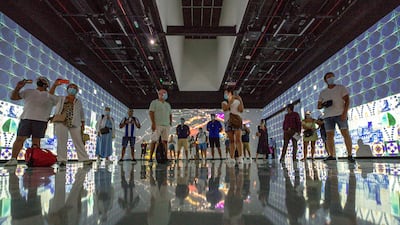Living in Expo 2020 Village, Francois Ndzue is one of hundreds of people who have travelled to Dubai for the first time to proudly represent his home country's pavilion.
Tucked in a quiet corner of the Sustainability district, you’ll find the 37-year-old standing tall in the Gabon pavilion.
Born and raised in the former French African colony, Mr Ndzue landed in Dubai on September 23, only three months after landing the job at Expo 2020 Dubai. It is his first time visiting what he calls "the land of the sand".
“I remember when the plane came in to land at Dubai I just saw all these tall buildings and the city lights, it was overwhelming,” he said.
Gabon pavilion
“Oh my goodness, that feeling I had when I was asked to work at Expo, it was great. I knew it would be such a good opportunity and it is the first time I’ve ever worked outside of Gabon, too.”
Living in Expo Village, which he affectionately called “a mini world in one place”, father-of-two Mr Ndzue is on a mission to present Gabon to the world.
Like any great salesmen, he greets visitors with some interesting facts about his native land. Did you know that 88 per cent of its land is covered by tropical forest? Or that its chocolate production is helping the country's economy to rebound?
“Actually, for many years, Gabon’s cocoa sector was ailing but now it is reviving,” he said.

“Our country is covered by 88 per cent of forest so we have a rich and vibrant supply of cocoa beans.
“You may say I am biased, but for me, Gabon chocolate is special. It is dark, rich, creamy and soon you will be able to taste it right here in our pavilion.”
In charge of logistics at the Gabon pavilion, Mr Ndzue said he is trying to bring a taste of his homeland to Dubai, with visitors soon able to purchase items such as banana chips and chocolate.
Though he has been in Dubai for less than a month, he said Expo has given him a “flavour of different cultures all in one place”.
So far he has visited several pavilions while off duty and is fascinated by the traditional dress of each country.
“I love seeing the different dress codes of different countries,” he said, “like Papua New Guinea, for instance. They have traditional dress, which is colourful. It mimics the core of our cultural dress but in Gabon we have a more modern take on it.“
"I like the similarity between both cultures.
“There’s the UAE, too. I found out more about the kandura, the traditional dress of Emirati men. The agal, which is used to hold the scarf on their head, can also be used to secure their camels, it’s so interesting.”
Hoping to bring his wife and two children, aged 9 and 3, to Expo in December, Mr Ndzue said their home pavilion will carry a sense of pride for his family.
And for those looking to visit, they must check out the array of traditional masks on show.
“Our masks hold a great deal of history and meaning and we use them for different ceremonies like births, weddings and funerals,” he said.
“They are made of many different woods and they can represent anything from celebration to grief.
“Both men and women can wear them but the ceremony and community dictates who wears what."
Inside the pavilion you can find the Punu-Lumbo, a tribal mask native to the Ogooue River basin in Gabon.
Community members create naturalistic, white-faced masks that convey idealised visions of womanhood. And the diamond-shaped pattern on the forehead represents scarification, a marker of cultural identity.











